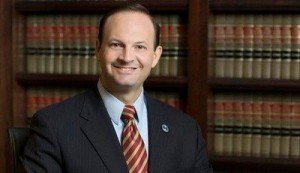
Tenth Amendment Overshadows Gambling Concerns During RAWA Testimony

South Carolina Attorney General Alan Wilson stressed the difficulties in limiting online gambling to within the confines of a state, though committee members were more intent in discussing the Second and Tenth Amendments. (Image: youtube.com)
The Tenth Amendment delegates powers not identified by the US Constitution to the States.
On Wednesday, numerous members of the House Oversight and Government Reform (OGR) Committee conveyed concerns they had in regards to how the Restoration of America’s Wire Act (RAWA), a federal bill to prohibit online gambling authored by Rep. Jason Chaffetz (R-Utah), might violate that core principal.
OGR Chairman Chaffetz introduced RAWA to Congress last February. He argues that a 2011 opinion by the Department of Justice on the Wire Act reversed longstanding federal law that banned Internet betting and casinos.
“The reason we’re here is because the Office of Legal Counsel issued an opinion reinterpreting what had been in the books for more than 50 years,” Chaffetz said during the hearing.
Several of his constituents reasoned that another law has been in the books for many decades as well, the Tenth Amendment, ratified 224 years ago.
RAWA vs. NRA
The subject of online gambling is difficult for politicians, and especially for Republicans.
Gambling is often labeled as a sin activity that is grouped with alcohol and tobacco. However, two key conservative principals are protecting the Constitution and keeping the federal government small.
RAWA would do neither, according to several OGR members.
Reps. Thomas Massie (R-Kentucky) and Mick Mulvaney (R-South Carolina) pressed the four witnesses giving testimony, primarily South Carolina Attorney General Alan Wilson, on the Tenth Amendment issue.
Mulvaney opined that if Congress can tell a state it can’t offer Internet gambling, that same Congress could tell a state it can’t sell firearms and ammunition online, the Second Amendment and perhaps most argued element of the Constitution.
Massie shared those views. “If we pass a national online gambling prohibition under the presumption that it’s necessary for federal legislation to overturn states laws, to deal with a state problem, couldn’t that logic be used in the same way with gun control?”
“What we’re talking about is interstate commerce which Congress has the authority to regulate,” Wilson responded.
Interstate vs. Intrastate
Representatives and witnesses seemed to go back and forth on trying to reach a mutual understanding of online poker and gambling and whether it’s an interstate or intrastate trade.
“If we could figure out a way to make sure only New Jersey residents gambled online in licensed New Jersey enterprises using technology, isn’t that another way to accomplish what you want to accomplish?” Mulvaney queried.
“I think it’s naïve at best to think you can put a wall on the Internet,” Chaffetz pronounced.
Republican Nevada State Senator Mark Lipparelli, one of the chief architects of online gaming in his state, said, “To represent that someone can anonymously play on a regulated Internet site is completely inaccurate. You have full-blown registration requirements that mandate people turn over social security numbers, personal identification, all of their activity … are all recorded within the system.”
Massive Problem, Chaffetz Says
Chaffetz began the hearing by entering a 2014 letter signed by 16 state attorneys general that backs RAWA into the record, as well as a 2015 attorneys general document that now only includes eight signatories.
The chairman also read a Newsweek article quoting that gambling is second only to financial institutions in settlements with the Department of Justice. “It shows what a significant problem the Department of Justice is currently having with it.”
But when pressed by other members of the OGR on specific instances where a regulated online gaming company was investigated by the DOJ, FBI witness Joseph Campbell said he possessed no examples at the current time.
Summary
The hearing saw plenty of skepticism among lawmakers in moving forward with restoring the Wire Act. FBI witness Campbell failed to demonstrate why states with legalized gaming might cause additional headaches for law enforcement.
Representatives appeared more interested with the Tenth Amendment than with the potential dangers of Internet betting. The Republican-controlled committee, though typically against gambling in general, is likely to be more concerned with the Constitution as it relates to RAWA.















0 Comments